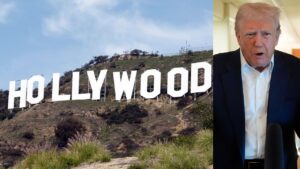President Trump announced a landmark 100% tariff on films produced outside the U.S. to combat the decline in domestic film production, framing it as both an economic and national security imperative. The initiative seeks to protect American jobs and cultural values amidst growing foreign competition.
Trump Proposes 100% Tariff on Foreign Films to Save American Cinema

Trump Proposes 100% Tariff on Foreign Films to Save American Cinema
In a bold initiative, President Trump aims to revive the U.S. film industry with a 100% tariff on foreign productions, citing economic and national security reasons.
In a bold move to stimulate the American film industry, President Donald Trump unveiled on Sunday a plan to impose a 100% tariff on all films produced outside the United States. This initiative is designed to stem the declining production of domestic films, as the President deems the situation a national security issue where foreign incentives are luring U.S. filmmakers overseas.
In his address, President Trump highlighted the grave challenges facing the domestic movie sector, stating, “The Movie Industry in America is DYING a very fast death.” His administration views the tariff as a means to bolster local film production and safeguard American jobs as well as cultural representation in media.
Moreover, Trump characterized the influx of foreign films as a national security concern, asserting that these productions could disseminate propaganda that undermines American values. He warned that international competition is not only detrimental to the film industry but also threatens the integrity of the nation's cultural narrative.
The implementation of the tariff is set to be managed by the Department of Commerce along with the U.S. Trade Representative, though details on its rollout remain to be seen. Commerce Secretary Howard Lutnick assured that the administration is committed to the effort, stating, “We’re on it.”
Responses from industry leaders and international stakeholders have ranged from concern about the ramifications of such tariffs to support for a measure believed to level the playing field for American filmmakers. Advocates argue that this tactic is crucial for ensuring the resilience of the U.S. movie industry.
This tariff plan is consistent with President Trump's wider economic agenda, focusing on promoting American industries and diminishing reliance on foreign investments. By taking this definitive stance, the administration aims to rekindle Hollywood’s dominance on the global stage while affirming the United States' role as a powerhouse in cinema.
As this policy progresses, its impact on revitalizing the film landscape will be under scrutiny. Nevertheless, the administration's dedication to preserving American cultural and economic interests is evident.






















